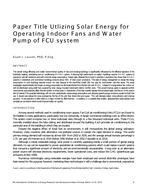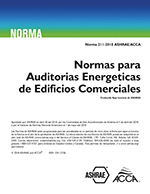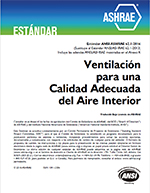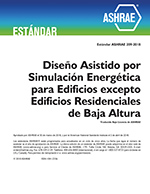Description
The overall energy efficiency and indoor environmental quality of new and existing buildings is significantly influenced by the effective operation of thebuilding’s heating, ventilating and air conditioning (HVAC) system. Achieving high performance on today’s buildings requires HVAC systems tooperate at optimal conditions and with minimal energy consumption. Recent data obtained from Saudi Electricity Corporation has shown that HVACsystems in residential and commercial buildings consume about 65% of total power production. The need of energy management to reduce the energyconsumption in such buildings becomes crucial not only because of the end-of-the month bill, but also for environment risk-free issues. The studyinvestigates experimentally the impact on energy consumption to eliminate the fan from the fan coil unit (FCU). Instead of a large central fan, indoor airwill be distributed using small fans powered by solar energy mounted inside each interior comfort zone. This would improve access to separate comfortzone controls and positively affect thermal comfort in those areas. Enhancement of the heat transfer between the circulated water and the air in the zone isalso of interest.This proposed technology will not only substantially reduce energy consumption and alleviate greenhouse gas emissions caused by fossil fueluse; it should also reduce the noise produced by the fan of the unit that shares the same space. This will decrease indoor noise pollution and improveacoustics. Noise pollution is often cited as a major irritant by office workers. In addition, it is possible that smaller, separated fans could achieve morecomplete air circulation which would improve indoor air quality.
Citation: 6th International Conference on Energy Research and Development, State of Kuwait, March 14–16, 2016
Product Details
- Published:
- 2016
- Number of Pages:
- 8
- Units of Measure:
- Dual
- File Size:
- 1 file , 930 KB
- Product Code(s):
- D-ICER16-02




